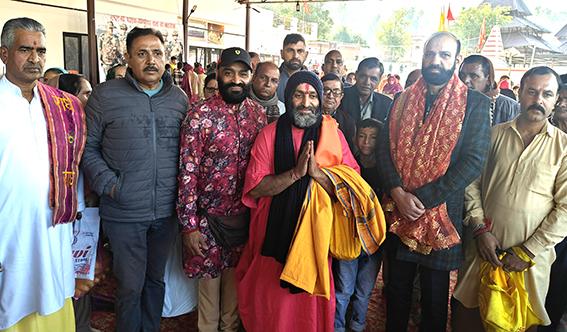| Religiosity, spirituality indispensable pillars of cardiovascular health : Dr Sushil | | |  Early Times Report Early Times Report
Jammu, Dec 1: In order to understand and highlight the relationship between religiosity and body mind practices in prevention of cardiac ailments Head Department of Cardiology GMCH Jammu Dr. Sushil Sharma held a day long cardiac awareness cum health checkup camp at Saint Shri Balak Yogeshwar Dass Ji Ashram, Pouni (Reasi). The camp was inaugurated by Saint Shri Balak Yogeshwar Dass Ji Maharaj along with Dr Sushil Sharma in presence of various disciples who gathered during the ongoing 41st Ati Maha Vishnu Maha Jagya in mythological memory of country’s Immortal martyrs. More than 1000 people were educated, screened, evaluated and diagnosed for various health ailments particularly in reference to cardiovascular diseases. Free medicine and diagnostics were also provided as per the requirements.
While interacting with the people Dr Sushil Stated that Cardiovascular disease (CVD) affects nearly half of all adults, who are 30% more likely to die of CVD than the overall population.
Prevention and management of major CVD risk factors are key for addressing these persistent CVD disparities for promotion of cardiovascular health. Religiosity may improve health through several mechanisms. Religiosity may improve stress levels and encourage people to live healthy lives, including the prevention of substance or alcohol abuse. Social support among believers may also provide positive effects on their health. Prayer and meditation as a part of religious activities may also be a form of relaxation. Individuals who have strong religiosity are significantly and likely to have favorable health habits for smoking, alcohol consumption, and exercise, as well as a better cardiovascular metabolic profile with the exception of obesity. Standard modifiable risk factors for CVD are cigarette smoking, excess alcohol, physical inactivity, poor diet/nutrition, high blood cholesterol, obesity, diabetes mellitus, high blood pressure, and psychosocial stress (including depression, anxiety, and personality traits such as hostility). Positive aspects include encouragement to live healthily, provision of mechanisms to regulate stress, and contribution to building a social support network.
This could be the result of discouragement of alcohol consumption or encouragement by religious leaders to be physically active.
He added that The American College of Cardiology and other major cardiovascular societies recommend palliative care for heart failure patients. Spirituality is a core domain of palliative care, with the goal of identifying and addressing spiritual concerns and providing patients with appropriate spiritual and religious resources.
However, limited research has been conducted on spirituality’s impact on patients with heart failure, and there are no known tools designed to measure it. According to the researchers, spirituality is hard to define, but they reference several definitions that describe spirituality as how individuals find meaning and purpose in life, which can be separate from religious beliefs. These health behaviors can influence cardio metabolic conditions and subsequently CVD risk.
Spirituality is more related to one’s emotional self-regulation, which could lead to less stress and therefore lower chances of developing cardio metabolic conditions and CVDs. Support from social networks can also influence this emotional self-regulation, He Said.
Management Committee of the Trust Saint Balak Yogeshwer Dass Ji Maharaj and Davinderjit Singh ( Pintu) appreciated the efforts of Dr Sushil and his team for conducting cardiac awareness cum health check up camp at such far flung area with special emphasis on maintaining spiritual well being which indirectly affects cardiovascular health.
Others who were part of this Camp includes Dr Yashwant Sharma, Dr Dhaneshwer Kapoor, Dr Abhinandan Thakur and Dr Sameer Mahajan. Paramedics and volunteers includes Raghav Rajput, Naveen Sharma, Rajkumar, Vikas Kumar, Gourav Sharma, Maninder Singh, Shubham Sharma, Rajat Verma, Nirvair Singh Bali and numerous disciple of the Ashram. |
|
